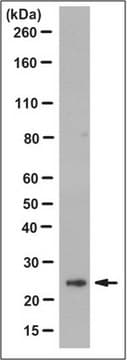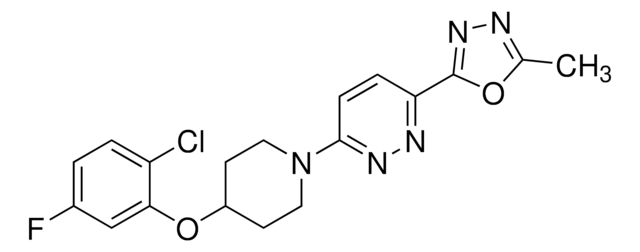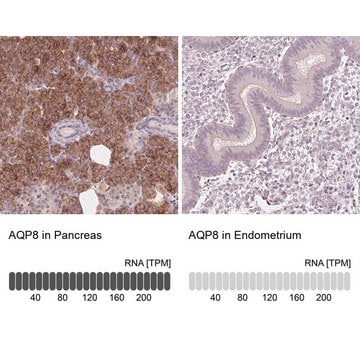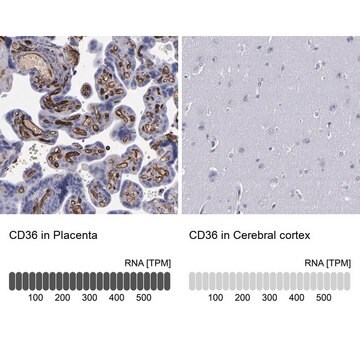MABC959
Anti-CD1d Antibody, clone WTH-1
clone WTH-1, from mouse
Synonyme(s) :
Antigen-presenting glycoprotein CD1d, CD1d
About This Item
Produits recommandés
Source biologique
mouse
Niveau de qualité
Forme d'anticorps
purified antibody
Type de produit anticorps
primary antibodies
Clone
WTH-1, monoclonal
Espèces réactives
mouse, rat
Technique(s)
activity assay: suitable
flow cytometry: suitable
immunohistochemistry: suitable
immunoprecipitation (IP): suitable
western blot: suitable
Isotype
IgG2aκ
Numéro d'accès NCBI
Numéro d'accès UniProt
Conditions d'expédition
dry ice
Modification post-traductionnelle de la cible
unmodified
Informations sur le gène
mouse ... Cd1D(110290701)
rat ... Cd1D(104874051)
Catégories apparentées
Description générale
Application
Flow Cytometry Analysis: A representative lot detected the surface expression of CD1d on isolated thymocytes from rats and mice, as well as on Raji transfectants expressing murine or rat CD1d (Monzon-Casanova, E., et al. (2010). PLoS One. 5(9): e13089).
Immunoprecipitation Analysis: A representative lot immunoprecipitated CD1d from isolated mouse and rat thymocytes, as well as exogenously expressed murine and rat CD1d from transfected Raji cells (Monzon-Casanova, E., et al. (2010). PLoS One. 5(9): e13089).
Immunohistochemistry Analysis: A representative lot detected CD1d immunoreactivity using frozen tissue sections from rats and mice (Monzon-Casanova, E., et al. (2010). PLoS One. 5(9): e13089).
Activity Assay: A representative lot inhibited CD1d antigen presentation cells from activating type I NK cells using total splenocytes from rats and mice. Clone WTH-1 also blocked mCD1d1-transduced LBB cells from activating co-cultured VIII24.1 murine type II NKT cells, while WTH-1 enhanced XV19.2 murine type II NKT cell activation by mCD1d1-transduced Raji cells (Monzon-Casanova, E., et al. (2010). PLoS One. 5(9): e13089).
Application Note: Clone WTH-1 (Cat. No. MABC959) and WTH-2 (Cat. No. MABC960) gave inferior IHC staining in mouse than in rat organs, especially in non-lymphatic tissues. In addition, clone WTH-2 produced a much lower signal in mice than mAb WTH-1. To detect low-grade expression, mouse non-lymphatic organs should be stained using a highly sensitive tyramide amplification procedure with inclusion of C57BL/6 CD1d2/2 mouse organs as negative controls (Monzon-Casanova, E., et al. (2010). PLoS One. 5(9): e13089).
Qualité
Flow Cytometry Analysis: 1.0 µg of this antibody detected CD1d in rat thymocytes and splenocytes.
Description de la cible
Forme physique
Autres remarques
Vous ne trouvez pas le bon produit ?
Essayez notre Outil de sélection de produits.
Code de la classe de stockage
12 - Non Combustible Liquids
Classe de danger pour l'eau (WGK)
WGK 2
Point d'éclair (°F)
Not applicable
Point d'éclair (°C)
Not applicable
Certificats d'analyse (COA)
Recherchez un Certificats d'analyse (COA) en saisissant le numéro de lot du produit. Les numéros de lot figurent sur l'étiquette du produit après les mots "Lot" ou "Batch".
Déjà en possession de ce produit ?
Retrouvez la documentation relative aux produits que vous avez récemment achetés dans la Bibliothèque de documents.
Notre équipe de scientifiques dispose d'une expérience dans tous les secteurs de la recherche, notamment en sciences de la vie, science des matériaux, synthèse chimique, chromatographie, analyse et dans de nombreux autres domaines..
Contacter notre Service technique








